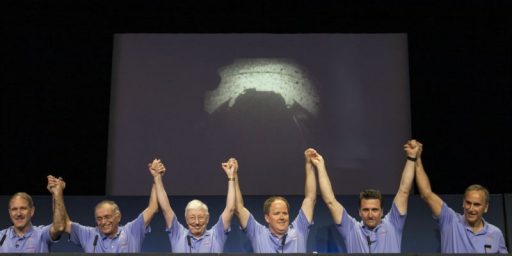BUSH: ANOTHER REAGAN? OR CARTER?
Donald Sensing has an interesting piece in which he explains why he fears that, despite talk of many Republicans that President Bush would become another Ronald Reagan, he seems instead to be turning into another Jimmy Carter. Specifically, he notes that Reagan was focused like a laser on three main Great Ideas (lower taxes, less government, rebuilding our military) whereas Carter was a man of hundreds of Big Ideas and thus unfocused. Citing a host of recent initiatives that seem to have come out of nowhere, notably the big immigration reform package and the announcemtn of a huge program to go back to the moon and on to Mars, Sensing wonders if the Bush team has an organizing principle.
Looking at Don’s bulleted list of the priorities outline in Bush’s 2000 campaign platform, it’s actually remarkable how many have been done or are well underway. Given the closeness of the margins in both Houses of Congress–close enough that the Democrats managed to take control of the Senate for nearly two years because of the treachery of a single Senator–and the tendency of Senate Democrats to filibuster on even relatively minor matters, it’s surprising. Frankly, Bush has gotten more of his policies enacted than I would have thought.
Plus, unlike Reagan, GWB faced a major event that refocused policy in his first term: namely, 9/11 and the resultant global war on terrorism. (Arguably, the Gorby ascendency did that for Reagan, but it wasn’t nearly so instantaneous). Many of the new initiatives, including the immigration bill, can likely be traced to the GWOT which has become, to continue the historic analogy, the equivalent of Reagan’s focus on defeating the communists. Indeed, the nexus between “Evil Empire” and “Axis of Evil” was surely not accidental.
I must confess, though, as to being baffled by the space thing. It does seem to have come out of nowhere and to be a rather misplaced priority right now. Granted, the first moon race was undertaken in the midst of Vietnam, the civil rights struggles of the 1960s, and the Great Society. But it was at least sold as part of the greater struggle to stay ahead of the Soviets (the bogus “missile gap”). The rationale for investing tens of billions for a trip to Mars escapes me.





Policy-for-politics would seem to point to Karl Rove, who might be expected to move on after this election. It would be interesting to see whether the drift stops in a second Bush term without Rove, or gets worse.
Bush still doesn’t seem to have a clear policy on how to deal with the confusion surrounding women’s clothing.
JL: So I’m led to believe. Probably, he thinks that’s a matter best left to the States.
“The rationale for investing tens of billions for a trip to Mars escapes me.”
Because it’s there. And we (the people) aren’t.
True. Although, frankly, I’d rather have ten billion Mars bars. (Or, preferably, Snickers.)
Focus? Less government? You’re kidding, right?
James, assuming the low end of Space Cadet’s numbers (10 billion), instead of 10 billion Mars bars, would you settle for 100,000 100 Grand bars? That’s a steal for the government!
Plus, I’m with Space Cadet. I think the Mars goal is great. I keep telling my kid we are going to go there in his lifetime and that he will be part of the mission.
And setting a positive goal for government is a positive change from all the moping about how miserable we all are with all of our problems (despite having the highest living standards in history!!!).
—